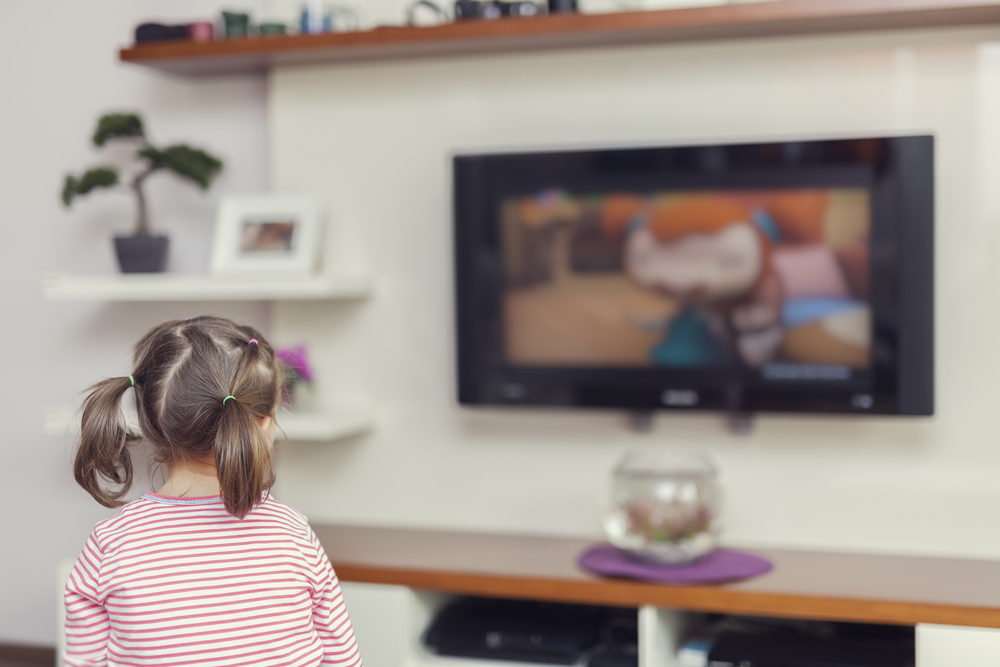
How Jewish Parents Can Filter Television for Children
Written by Talia Avrahami
“Oy gevalt!” I desperately exclaimed, right after checking on my toddler. I had briefly left my daughter in our living room’s playpen listening to the Beauty and the Beast soundtrack playing on the television, so that I could fold laundry.
“What is this?” I instinctively spat out in Yiddish, as a look of horror and despair fell over me. I could feel my skin becoming paler. The television had betrayed me. It went from singing educational French language songs about the joie de vivre of living in the French countryside to something else. It was playing a proselytizing advert about how some Jews have come to accept the Christian messiah.
I was mortified. Although this is clearly an extreme example, the simple fact of the matter is that unfiltered television and media can be in conflict with the way we want to raise our children. Thankfully, several options exist today for protecting our boys and girls from the dangers of unfiltered television.
With regards to inappropriate commercials, a simple solution would be to watch television without commercials. Hulu+, YouTubeTV, Netflix, Disney+, and many other streaming services allow you to watch television shows and movies without any advertisements whatsoever. You can even add them as channels to a smart television, so it feels no different than turning on cable (except you would no longer have to worry about commercials for horror or sexualized movies appearing). In fact, over the last few years, the proportion of American households with streaming services has grown to 88%, according to a study by Kantar’s Entertainment on Demand. Furthermore, only 56% of American households currently have cable, according to a study by Pew Research.
Another option that exists is to use computer software to filter out foul language. VidAngel is a resource with hundreds of movies available, but it has also filtered out profane language that we do not want our children to regularly hear.
Newer technology — like TVGuardian — will even connect to your television and automatically filter out vulgar words in whatever is playing on your television by reading ahead in the show or movie’s closed captions and emitting a buzzing sound over the inappropriate word. This is particularly useful for the next generation of teenage shows and movies, which sometimes have teenage-friendly themes and topics but also some vulgar language.
Overall, it is also a good idea to limit what your children can watch based on age. In the US, television shows have ratings ranging from Y (Youth) to MA (Mature) and movies have ratings ranging from G (General) to R (Restricted). Most cable companies and streaming services allow you to restrict showing higher rated shows and movies by requiring a password to be entered when a show or movie of that rating airs. This way you can still watch a higher rated show at night while the children sleep, but they can only access age-appropriate content.
There is also the simple option of watching television shows and movies with your children. As your children get older and enter middle school and high school, you can slowly start to watch slightly higher rated content with them and begin a dialogue with them when challenging topics arise.
Why are there other religions? Why is there anti-Semitism in the world? Why do some people leave Orthodoxy? We can discuss these issues with our children, educate them in machshava (Jewish philosophy), and prepare them for the greater world. We teach our girls to light Shabbat candles and bake challah, even though the non-Jewish babysitters do not do those things. We teach our boys to wrap tefillin, even though the non-Jewish neighbors do not. For adolescents watching television or movies, we can similarly explain to them that some things others do, but some things we do not do.
The most radical option would obviously be to completely ban your children from watching television. After all, some traditional Bais Yaakovs (girls’ schools) and yeshiva ketanas (boys’ schools) request this from families before admitting their children. However, not only is sheltering children from the world dangerous and prevents them from learning about the beautiful world that Hashem has created, it is also unnecessary. There are a myriad of options that exist that allow you to give your children access to healthy shows without compromising your values.

The simple fact of the matter is that unfiltered television and media can be in conflict with the way we want to raise our children.
Related Articles
Related
Kids & Technology
The scene is familiar. You try speaking to your kid and hear a grunt in response, you turn around and you see that they are totally engrossed in their device. You call them again, again you hear a grunt. Finally you get super close to them and say, “It’s time to...
Evaluating Single-Sex and Co-Ed Schools
Winter is ending and spring is beginning; the time for choosing a Jewish day school is near and one of the biggest questions that parents and students face is whether to enroll in a single-sex or a co-ed school. Boys’ schools, girls’ schools, and co-ed schools have...
Kumzitz and Laugh
In the darkest recesses of the human mind, in a place so heavy with shadow it seems impossible for a pinprick of light to shine through, a spark exists. That tiny ray seems like a direction, a point of promise, a simple moment of relief from the reality of the world...
